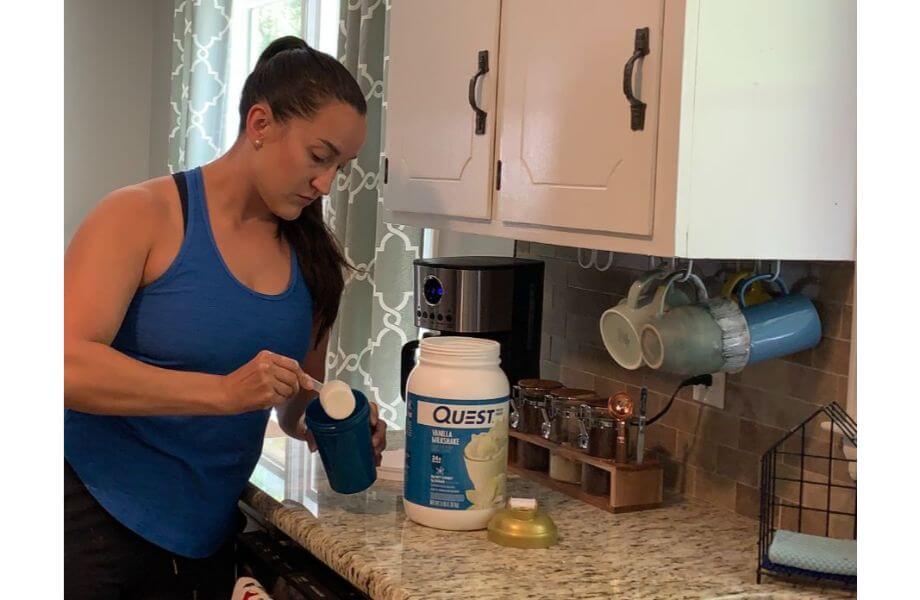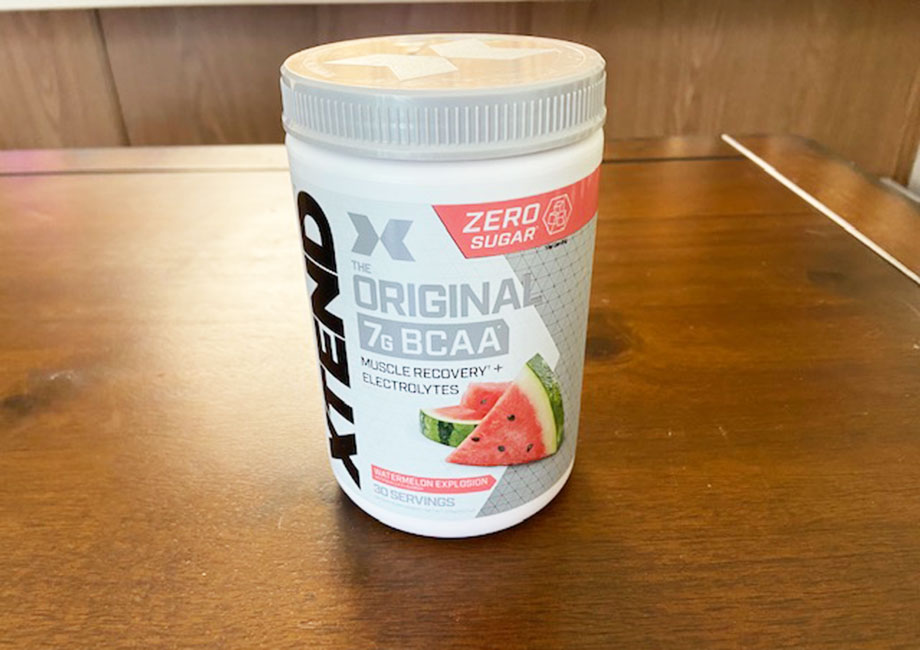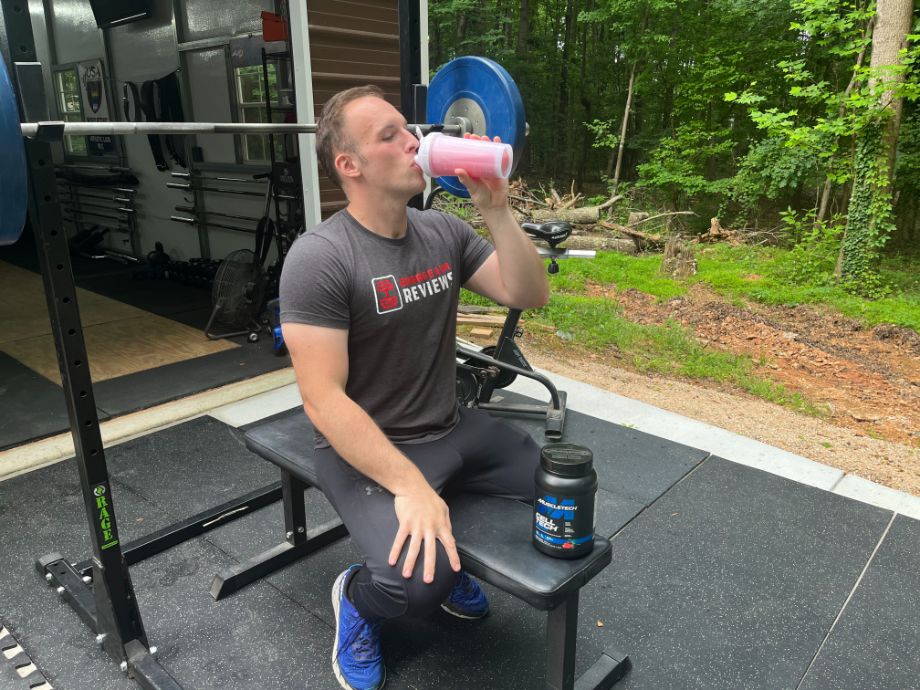If you’re looking to add a budget-friendly, delicious-tasting protein powder to your nutrition regime, look no further than this Quest protein powder review, where we’ll dig deeper into what Quest has to offer and explore how their mission to feel freedom towards your cravings for all things sweet and salty holds up.
Quest prides themselves on customer satisfaction, quality protein ingredients, and engaging their product buyers. They set their customer engagement bar high through options such as a rewards program, newsletter, and a unique recipe library. Does Quest protein powder meet expectations or fall flat? Let’s find out.
Plus, new in 2024, GGR did its own lab testing of more than 150 protein powders, including Quest, to see how they stack up in terms of label accuracy and purity. Read on to find out more about how Quest fared.
Medical disclaimer: This article is intended for educational and informational purposes only. It is not intended as a substitute for medical advice. For health advice, contact a licensed healthcare provider. GGR also recommends choosing a product that has been third-party tested for quality.
Our Credentials Remove Confusion
When it comes to credibility, our team of testers holds several professional certifications to bring you the most informed product reviews. To name a few, our team is composed of registered dietitian nutritionists, CrossFit-L1 trainers, certified personal trainers, and certified nutrition coaches. Our experience and formal training help guide us to take the confusion out of product shopping for you.
Our team has tested nearly 120 protein powders with respect to taste, solubility, price, side effects, and formulation, among other criteria. Regardless of where you are in your nutrition and fitness journey, we can help guide you to choose the best protein powder that works for you and your lifestyle.
A Quick Look at Quest Protein Powder
Quest Protein Powder
Quest Nutrition Protein Powder
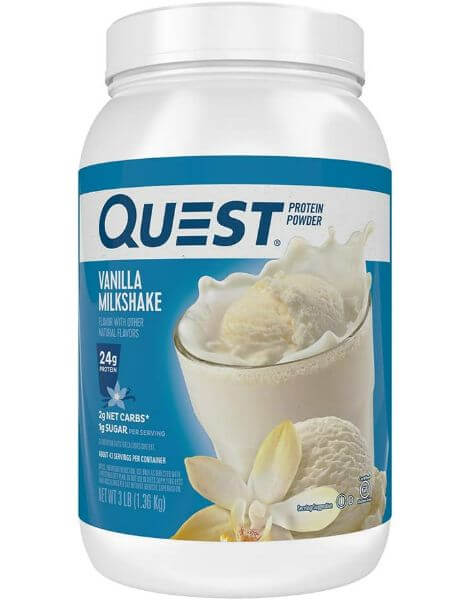
Product Highlights
- Made with fast- and slow-absorbing proteins
- Contains 9 amino acids
- Sweet flavors help curb cravings
- Complete proteins help keep you full
Pros & Cons
Pros
- Low in carbs
- Comparably affordable per serving cost
- Balanced for workouts
Cons
- Contains sucralose
- Contains soy
- Thick texture
Bottom Line
With plenty of great flavors, Quest Nutrition Protein Powder is a great option for those who get bored of the same flavor of proteins.
Quest as a brand has a historically modest origin story. The married co-founders Ron and Shannan Penna started the company in 2010 by personally hand-rolling chocolate chip cookie dough protein bars in their kitchen.
In four short years, they went from hand-making to mass production. The Chocolate Chip Cookie Dough Quest protein bar was so popular that in 2014, they were also mass-producing Quest protein chips and Quest protein powder. Now, Quest offers a variety of products, including protein bars, protein cookies, protein chips, protein crackers, protein candy, protein shakes, and even protein pizza crust.
RELATED: Best Protein Bars
Before You Buy
- You can enroll in the free Quest Achievers Loyalty Program to get coupons and benefits for every purchase you make (and more!)
- Quest offers a free estimate for how quickly you will receive your order based on what your shipping zip code is
- Shopping Quest protein powder on Amazon will provide you with a much better price-per-serving than on the Quest website
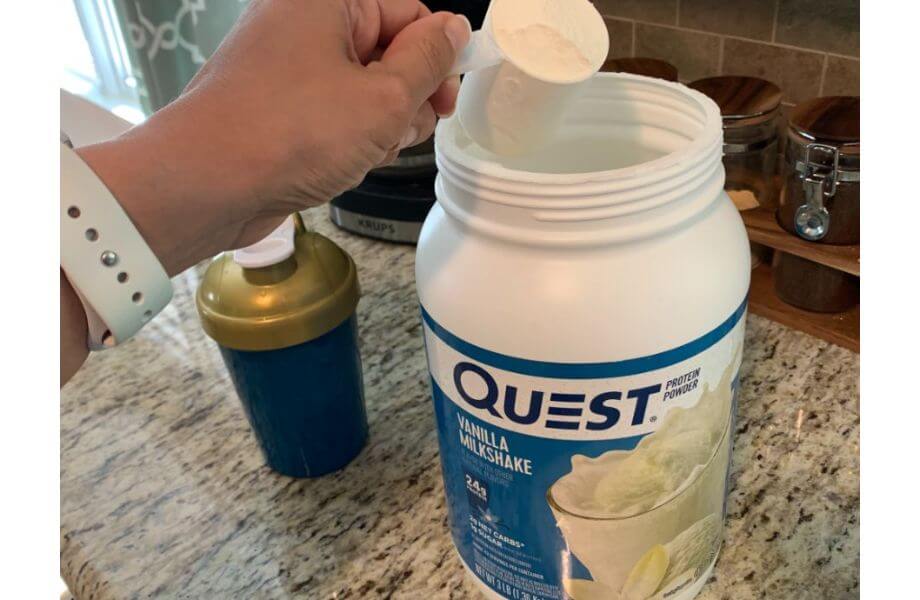
Is Quest Protein Powder Worth It?
Quest protein powder’s macronutrient content will vary depending on your flavor choice. Per scoop, you’re looking at 20 to 26 grams of protein, 1 to 7 grams of carbohydrates, and 0.5 to 1.5 grams of fat. If you’re buying directly from Quest, you’ll get a price of about $1.30 per serving, or about $1.10 on Amazon.
Based on these specs (and many more), is Quest protein powder worth it? Let’s take a look at who we would and would not recommend this product for:
Great for:
- Those in need of a low-fat and low-carbohydrate powder (depending on the flavor of protein powder)
- Those on a budget—cost per scoop is comparatively lower than other protein powder brands
- Those looking for a gluten-free option—all Quest protein powder is certified gluten-free
Not recommended for:
- Someone who has a dairy allergy or sensitivity—know that Quest protein powder uses dairy-derived protein
- Someone who has a soy allergy or sensitivity—some Quest protein powders may no longer be soy-free due to supply issues
- Someone who has gastrointestinal sensitivity to artificial sweeteners—Quest protein powders contain sucralose and stevia
Quest Protein Powder Specs
| Price per serving | $1.30 |
| Serving size | 1 scoop (28-34 g) |
| Flavors | Vanilla Milkshake, Chocolate Milkshake, Salted Caramel, Peanut Butter, Cinnamon Crunch, Cookies & Cream, and Unflavored |
| Calories per serving | 100-120 |
| Protein per serving | 20-26 g |
| Carbs per serving | 1-7 g |
| Fats per serving | 0.5-1.5 g |
| Third-party tested? | No |
Experience Using Quest Protein Powder
If you’re looking for a protein powder that easily dissolves, mixes well, and has a great taste, Quest protein powder has you covered. GGR’s head of content and expert product tester Kate Meier has great things to say about this supplement.
“I really like this protein powder—even my two kids drink it willingly,” she explains. “It mixes great and tastes like a milkshake with a rich taste and no artificial notes. We’ve been testing a lot of protein powder over the last few months, and this is one I keep coming back for!”
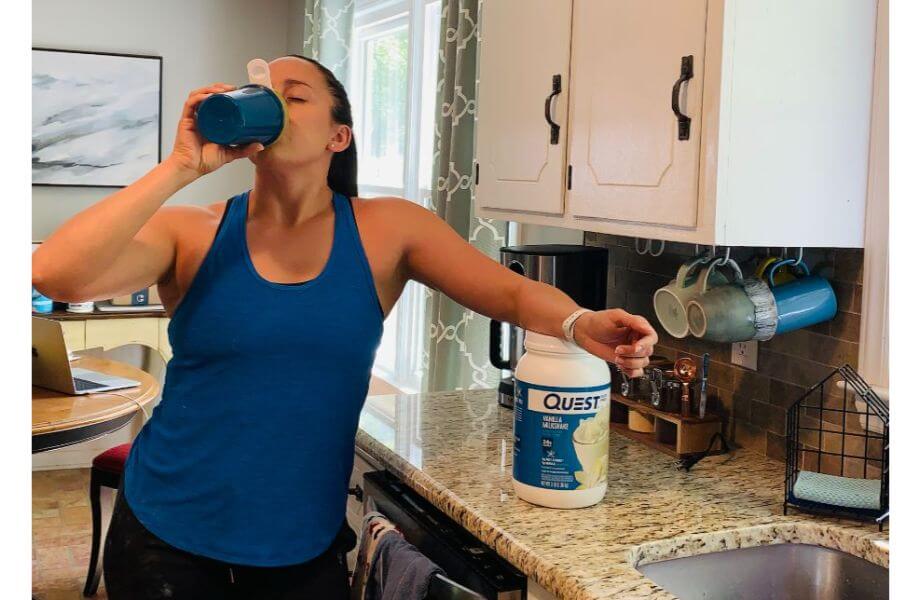
Price Per Serving
If you’re buying directly from Quest, a 3-pound container will cost $55.99 and has approximately 43 servings, making it $1.30 a scoop. A 1.6-pound container will cost $37.99 and has approximately 24 servings, making it $1.58 a scoop.
If you’re an Amazon Prime member, you can get Quest protein powder at a reduced cost. Prime members can find 3-pound containers for $46.44, making it $1.08 a scoop. Depending on the flavor choice, Prime members can find 1.6-pound containers for $30.96 to $35.79, or $1.29 to $1.49 a scoop respectively.
This is definitely on the affordable end for protein powder, with other popular brands like Isopure Zero Carb protein powder coming in at $2.13 per serving and Optimum Nutrition Gold Standard 100% Whey Protein coming in at $1.55 per serving. Another Quest competitor, Premier Protein, comes in at a very similar price of $1.33 per serving.
Formulation
So, what goes into Quest Protein Powder?
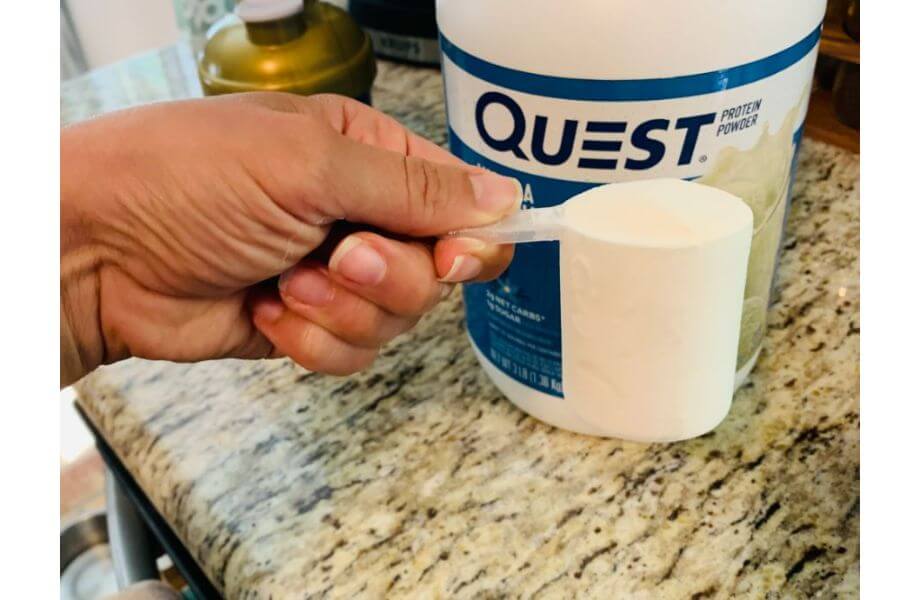
Quest is transparent about what their recipes are formulated with. A few things that stand out is that the powders consist of complete dairy-based protein and are a good source of calcium. A 2018 systematic review and meta-analysis¹ reviewed adequate dairy intake and how it can lower your risk for developing metabolic syndrome. To put it simply, appropriate dairy intake can decrease your risk for heart disease and Type 2 diabetes.
You have probably heard that calcium builds strong bones. With regard to bone health, high protein intake can actually have negative effects if you do not intake adequate calcium². We are pleased to see that most Quest protein powders offer 20 to 25% of your recommended daily value for calcium.
Depending on flavor choice, for every scoop of Quest protein powder you can plan on getting 20 to 26 grams of protein, 1 to 7 grams of carbohydrates, and 0.5 to 1.5 grams of fat. (A few additional ingredients, like sea salt, cellulose gum, xanthan gum, are also added to enhance flavor and texture.) Let’s review the Quest Nutrition protein and general nutrition facts label together:
Protein
Protein is characterized by³ both its digestion and absorption rate. Whey protein is considered to be a fast protein, while casein is considered to be a slow protein. Quest protein powders are derived from both whey and casein, meaning that you will get dual digestibility and absorption.
Research3 tells us that a dairy protein blend, such as whey and casein, is superior to soy-derived proteins with regard to building muscle mass. A dairy protein blend is not only superior to soy protein for gaining muscle mass, but also the ingestion of both casein and whey leads to different peak times in muscle-building.
Since Quest protein powder offers 20 to 26 grams of protein depending on the flavor, you can rest easy knowing that you’re getting a complete dairy protein—and a sizable amount of protein—per scoop. As long as you don’t have a dairy allergy or sensitivity, whey isolate and casein are more easily digested than other proteins, such as soy-derived protein.
Since a complete dairy protein consists of both casein and whey isolate, it will help you to feel fuller for longer because it offers both initial and later-onset digestibility times. Protein4, one of the three overarching macros, is known for its effect on satiation. It’s better at helping you feel fuller for longer than fat and carbohydrates, which is helpful when being mindful of body weight maintenance.
Carbohydrates and Fat
In addition to protein, carbohydrates and fat complete the macros trifecta. Carbohydrates and fat are essential to function and perform activities of daily living. Protein powders are typically exactly that—powder packed with protein—so the ratios of carbs and fats should be lower.
Quest protein powder offers 1 to 7 grams of net carbs and 0.5 to 1.5 grams of fat, depending on the flavor. The flavors that are low-sugar, lower in carbohydrate, and lower in fat content are Vanilla Milkshake, Chocolate Milkshake, Peanut Butter, Salted Caramel, and Unflavored. The Cinnamon Crunch and Cookies & Cream flavors have a higher fat and carbohydrate load comparatively.
Vitamins and Minerals
If you’re looking for a protein powder that’s packed with vitamins and minerals, Quest is probably not the best choice. Arguably, the only mineral that Quest has a significant amount of is calcium. Calcium content varies from 290 milligrams to 320 milligrams, which is 20% and 25% of your recommended daily value respectfully. As mentioned above, calcium is a mineral that plays an important role in bone health.² However, the vitamin most well-known for bone health— Vitamin D²—is not significantly present in any Quest protein powders.
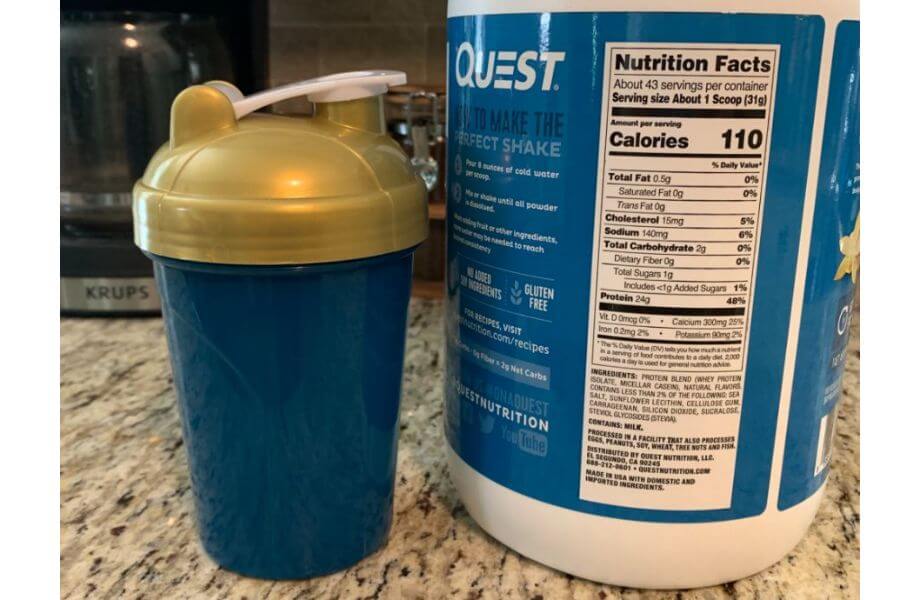
Taste and Solubility
Our team tried the Vanilla Milkshake flavor of Quest protein powder, but there are six other flavors offered: Chocolate Milkshake, Salted Caramel, Peanut Butter, Cinnamon Crunch, Cookies & Cream, and Unflavored. The water-to-powder ratio to dissolve Quest protein powder is recommended as 8 ounces for every scoop, which makes it smoother.
While Kate says Vanilla Milkshake Quest is not her all-time favorite, it’s great mixed with water without tasting watery and gross. “It has a rich taste that is very vanilla! You don’t need to mix this with anything else; totally awesome on its own, plus it blends easily in a blender bottle—literally not one issue with mixing with water or with milk.”
Side Effects
People with dairy and/or soy protein allergies should avoid this product. It contains an emulsifier blend of soy lecithin and sunflower lecithin, in addition to milk protein isolate. People with a peanut allergy should avoid the Quest Peanut Butter protein powder as well, as it contains peanuts.
Third-Party Testing
Dietary supplements are not regulated by the Food and Drug Administration (FDA). Due to this, third-party testing is imperative to lend a brand credibility for safe consumption. While Quest protein powders have all received the Certified Gluten-Free status through the Gluten-Free Certification Organization (GFCO), they don’t have any additional certifications through organizations like NSF, Informed Choice, or Banned Substance Control Group.
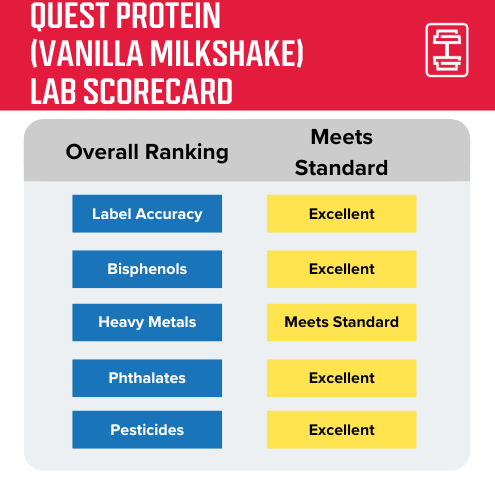
However, GGR enlisted independent, accredited lab Ellipse Analytics to do our own testing on more than 150 protein powders and Quest protein in Vanilla Milkshake received a Meets Standard overall mark, which means that it passed our rigorous quality screen in both label accuracy (protein content) and purity (heavy metals, bisphenols, phthalates, and pesticides).
We detail more about each of the factors that we tested for in our Independent Supplement Testing glossary if you’re curious, but just know that the presence of one of these contaminants does not make a product immediately harmful; testing like this will allow consumers to manage their own personal risk.
So, despite this product meeting GGR’s testing standard, lack of third-party certification from a large organization like NSF or Informed Choice could be a dealbreaker for athletes, as they’ll need to be certain that what they’re consuming is exactly what’s on the label. For others, while probably not a dealbreaker, it’s a factor to be cognizant of.
Comparison to Optimum Nutrition Gold Standard 100% Protein Powder
Optimum Nutrition Gold Standard 100% Protein
Optimum Nutrition Gold Standard 100% Whey
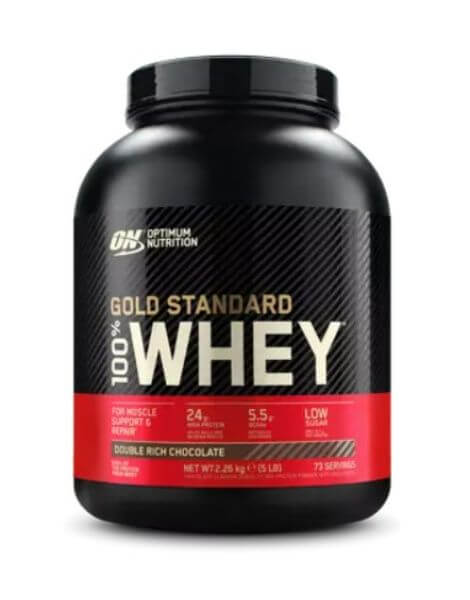
Product Highlights
- Contains 3 different kinds of whey protein
- Tested for banned substances
- Over 5 g of BCAAs per serving
- Instantized to help prevent clumping
Pros & Cons
Pros
- Affordable
- Contains research-backed amounts of protein per meal needed to build muscle
- Plenty of flavor options
- Low in carbs
- Free shipping on orders over $75
Cons
- Some users say it's overly sweet
- Contains artificial flavors
- Most flavors contain sucralose
Bottom Line
Optimum Nutrition Gold Standard 100% Whey is a team favorite for its budget-friendly prices and taste. Our team has tried multiple Optimum Nutrition flavors, and every one is ranked a 4 or 5 out of 5.
Optimum Nutrition Gold Standard 100% protein powder comes in 11 more flavors than Quest Protein Powder does. So, if you are looking for a specific flavor profile, Optimum does have more variety to choose from.
Optimum has 24 grams of protein per scoop in every flavor offered, whereas Quest has anywhere from 20 to 26 grams of protein per scoop depending on the flavor chosen. To get specific, Optimum protein is 100% derived from whey, whereas Quest protein is derived from both whey and casein. Optimum also has 5.5 grams of branched-chain amino acids (BCAAs) per scoop, whereas Quest offers none. BCAAs have been shown5 to support muscle-building and recovery post-workout.
Optimum and Quest both have a similar low-calorie content per scoop. Depending on where you purchase your protein powder from, Quest is roughly 20 cents cheaper than Optimum per scoop.
Each protein powder brings different benefits. Optimum Nutrition would be a better choice for someone looking for a protein supplement to take post-workout, due to it being 100% whey protein powder and containing BCAAs. Quest would be a better choice for someone looking for a protein supplement to help with weight loss since it has both casein and whey to help with both fast and slow digestion and absorption.
Read our full Optimum Nutrition 100% Whey Gold Standard review to get our full thoughts on this fan-favorite protein powder.
Customer Experience
Products bought through the Quest website are eligible for return or replacement within 90 days of purchase for a full refund of its purchased price or complete purchase replacement. If you want to return or replace an item after 90 days of the purchase date, product defects and ordering issues are taken into consideration.
Quest offers several ways to contact them: by phone, email, snail-mail, and a messenger contact form. If you subscribe to their newsletter for continued contact, you are eligible to receive a 10% discount off your next order.
The Quest website offers some nice bonuses as well, including a recipe subpage that offers different ideas for repurposing their products into fun meals and snacks!
Ordering Quest Protein Powder
The ordering process through the Quest website is relatively straightforward: Add the items you want to your online cart, fill out your shipping information, and proceed to payment. If you’re looking for convenience, Quest does offer two express checkout options: ShopPay and PayPal.
When purchased from the Quest website, shipping can get pricey. On the low end, orders up to $30 have an additional $9.95 shipping fee, and on the high end orders that are $65.01 to $79 have an additional $13.95 shipping fee. All purchases over $79 are offered free shipping. A fuel surcharge of $1.25 is added to every order. A surcharge of $2.99 is added for chocolate-containing shipments going to locations above 74 degrees F. Shipments arrive between 1 to 8 business days.
As mentioned before, you can save more money per scoop if you purchase Quest protein powder as an Amazon Prime member. With respect to shipping, ordering from Amazon as a Prime member will also save you a good bit of money. Overall, ordering from the Quest website is beneficial if you are enrolled in their rewards program but if you’re looking for a quick purchase, Amazon might be a better route financially.
Customer Reviews
At the time of this writing, Quest protein powder has an average rating of 4.4 out of 5 stars with more than 38,500 reviews on Amazon. Quest protein powder has an average of 4.7 out of 5 stars with 1,285 reviews on their website.
With 4.8 out of 5 stars and 104 reviews, Quest Unflavored protein powder tied for the highest rank on their website:
With 4.6 out of 5 stars and 5,970 reviews, Quest Vanilla Milkshake Protein Powder ranked the highest on Amazon:
With 4.8 out of 5 stars and 266 reviews on their website, Quest Vanilla Milkshake Protein Powder received lower ratings from its reviewers due to how sweet it tasted:
Final Verdict of Our Quest Protein Powder Review
If you’re searching for a simple, flavorful protein powder that contains both whey and casein, Quest protein powder is an excellent choice. Quest protein powder is:
- Low-carb, low-fat, and high-protein—a true protein supplement
- Low in cholesterol and sodium⁶, which is a protective factor against heart disease
- Limited in vitamins, minerals, and BCAAs—this is not a meal replacement and may need a branched-chain amino acid supplement taken along with it for those participating in vigorous exercise and seeking quick muscle recovery
Quest Protein Powder Rating
Quest Protein Powder

In our Quest protein powder review, find out if this popular supplement is all it’s cracked up to be.
Product Brand: Quest
Product Currency: $
Product Price: 54
Product In-Stock: InStock
4.13
Quest Protein Powder FAQs
Is Quest protein good for you?
Quest Protein Powder can be good for you, depending on what your nutrition and wellness goals are. If you’re looking for a meal replacement product, Quest protein powders are not a good option. However, if you’re looking for supplemental protein to add to your exercise routine or enrich your snacks or meals, Quest protein powder is a fantastic choice.
Is Quest protein good for weight loss?
Since protein is a satiating macronutrient, it helps you to feel fuller for longer and possibly curb hunger hormone responses. Quest protein powder offers a complete dairy protein profile by containing both whey protein isolate and micellar casein. Because whey protein isolate and micellar casein offer different absorption and digestibility rates, your satiation response should last longer than if you had just one of the two proteins. Most Quest protein powder is also low in carbohydrate and fat content. When safely supplementing your daily macro requirements with Quest protein powder, weight loss could be achieved.
Why is Quest protein powder so expensive?
Quest Protein Powder is expensive when purchased directly from Quest. Your purchase total can add up quickly with shipping costs and associated fees. However, Quest protein powder is reasonably affordable when purchased through other retailers like Amazon.
Is Quest protein good for building muscle?
Overall, yes. Quest protein powder packs a punch with protein content per scoop. It also offers two types of dairy protein that aid in muscle-building and recovery.
These statements have not been evaluated by the Food and Drug Administration. This product is not intended to diagnose, treat, cure, or prevent any diseases.
References
- Lee M, Lee H, Kim J. Dairy food consumption is associated with a lower risk of the metabolic syndrome and its components: a systematic review and meta-analysis. Br J Nutr. 2018;120(4):373-384. doi:10.1017/S0007114518001460
- Sale C, Elliott-Sale KJ. Nutrition and athlete bone health. Sports Med. 2019;49(2):139–151. doi:10.1007/s40279-019-01161-2
- Kanda A, Nakayama K, Sanbongi C, et al. Effects of whey, caseinate, or milk protein ingestion on muscle protein synthesis after exercise. Nutrients. 2016; 8(6):339. doi:10.3390/nu8060339
- Morell P, Fiszman S. Revisiting the role of protein-induced satiation and satiety. Food hydrocoll. 2017; 68:199-210. doi:10.1016/j.foodhyd.2016.08.003
- Brestensky M, Nitrayova S, Patras P, et al. Branched chain amino acids and their importance in nutrition. J Microbiol Biotech Food Sci. 2015;5(2):197-202. doi:10.15414/jmbfs.2015.5.2.197-202
- Aburto NJ, Ziolkovska A, Hooper L, et al. Effect of lower sodium intake on health: systematic review and meta-analyses. Br Med J. 2013;346:1-20. doi:10.1136/bmj.f1326


